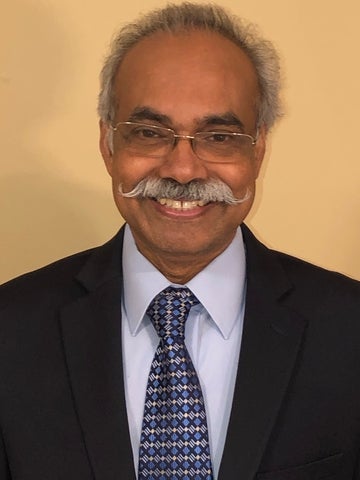The Waterloo Institute for Nanotechnology (WIN) is pleased to present a Distinguished Lecture by Dr. Thomas Thundat, a SUNY Distinguished Professor and a SUNY Empire Innovation professor in the Department of Chemical and Biological Engineering at the University at Buffalo, The State University of New York, Buffalo, NY.
Please join us on Monday, September 30 at 11 a.m. to hear Professor Thundat's lecture titled "Real-time ultra-trace detection with molecular selectivity – A bridge too far?"
Where: QNC 1501
When: Monday, September 30, 2024 | 11 a.m. - 12 p.m.
About the lecture
The recent advances in Artificial Intelligence and data analytics are catalyzing a resurgence in sensors to provide real-time monitoring for food safety, agriculture, the environment, healthcare, animal health, and water quality. Physical sensors such as temperature and mass sensors are well developed. In contrast, progress in chemical sensors has been modest. Most chemical sensors exploit physical platforms enhanced or functionalized with immobilized chemical interfaces for molecular selectivity. Although molecular engineering of interfaces can impart chemical selectivity in sensing, operation in complex environments containing interferents challenges the fidelity of the signals and reliability of the results. Achieving high chemical selectivity, however, has been a formidable challenge for miniature sensors. A multi-modal approach based on microfabricated arrays and data analysis using advanced machine learning algorithms can offer high selectivity and sensitivity in chemical sensing. For example, light-matter interaction with low thermal mass structures can provide higher molecular selectivity in chemical and biological sensing. This approach also allows standoff sensing of chemicals and materials where the interaction of analyte molecules with sensor material is not required. I will present some of our recent results on plastic waste identification for recycling, the detection of PFAS in water to meet the EPA regulations, and the detection of hazardous chemicals in the air. Another challenge for miniature sensors has been the size of batteries. I will address the question of powering distributed sensor networks using a novel technique for delivering electrical power using a “single wire no return”— a concept first proposed by Nikola Tesla over one hundred years ago.
About the speaker

Dr. Thomas Thundat is a SUNY Distinguished Professor and a SUNY Empire Innovation professor in the Department of Chemical and Biological Engineering at the University at Buffalo, The State University of New York, Buffalo, NY. He is also a Distinguished Professor (honorary) at the Indian Institute of Technology, Madras. He was a Canada Excellence Research Chair professor at the University of Alberta, Edmonton, Canada (2010-2017). He was a research group leader for Nanoscale Science and Devices Group and a UT-Battelle Corporate Fellow of the Oak Ridge National Laboratory (ORNL) until 2010. He received his Ph.D. in physics from the State University of New York at Albany. He has authored over 500 publications in refereed journals, 85 conference proceedings, 45 book chapters, and 46 US patents. He is an elected Fellow of the American Physical Society (APS), the Electrochemical Society (ECS), the American Association for Advancement of Science (AAAS), the American Society of Mechanical Engineers (ASME), the SPIE, the American Society of Biomedical and Biological Engineers (AIMBE), Institute of Electrical and Electronics Engineers (IEEE), and the National Academy of Inventors (NAI). His research focuses on developing new concepts in nanomechanical sensing, energy conversion, electrical energy transmission using a single wire, and novel ideas for charge separation and storage.